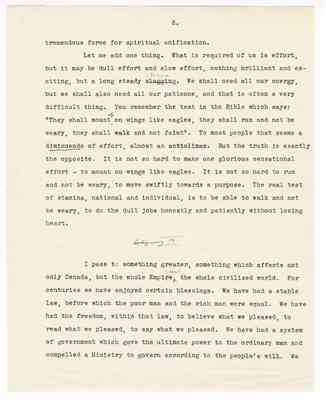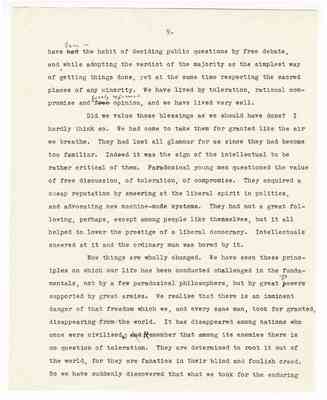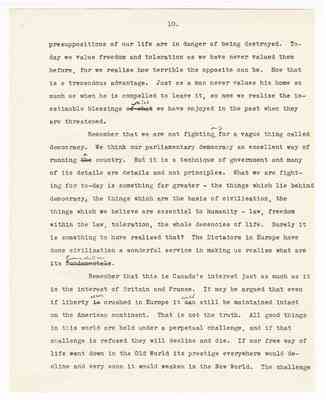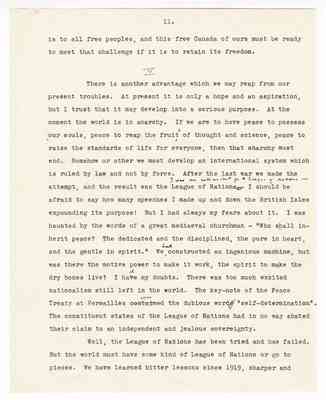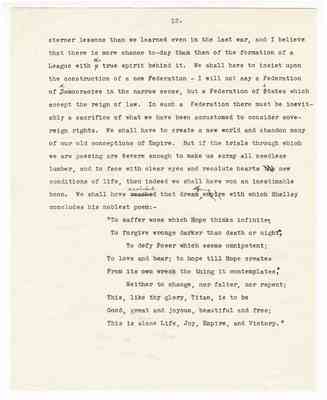Pages
page_0011
8.
tremendous force for spiritual unification.
Let me add one thing. What is required of us is effort, but it may be dull effort and slow effort, nothing brilliant and exciting, but a long steady strain. We shall need all our energy, but we shall also need all our patience, and that is often a very difficult thing. You remember the text in the Bible which says: "They shall mount up on wings like eagles, they shall run and not be weary, they shall walk and not faint". To most people that seems a diminuendo of effort, almost an anticlimax. But the truth is exactly the opposite. It is not so hard to make one glorious sensational effort - to mount on wings like eagles. It is not so hard to run and not be weary, to move swiftly towards a purpose. The real test of stamina, national and individual, is to be able to walk and not be weary, to do the dull jobs honestly and patiently without losing heart.
IV
I pass to something greater, something which affects not only Canada, but the whole Empire and the whole civilised world. For centuries we have enjoyed certain blessings. We have had a stable law, before which the poor man and the rich man were equal. We have had the freedom, within that law, to believe what we pleased, to read what we pleased, to say what we pleased. We have had a system of government which gave the ultimate power to the ordinary man and compelled a Ministry to govern according to the people's will. We
page_0012
9·
have been in the habit of deciding public questions by free debate, and, while adopting the verdict of the majority as the simplest way of getting things done, yet at the same time respecting the sacred places of any minority. We have lived by toleration, rational compromise and freely expressed opinion, and we have lived very well.
Did we value those blessings as we should have done? I hardly think so. We had come to take them for granted like the air we breathe. They had lost all glamour for us since they had become too familiar. Indeed it was the sign of the intellectual to be rather critical of them. Paradoxical young men questioned the value of free discussion, of toleration, of compromise. They acquired a cheap reputation by sneering at the liberal spirit in politics, and advocating new machine-made systems. They had not a great following, perhaps, except among people like themselves, but it all helped to lower the prestige of a liberal democracy. Intellectuals sneered at it and the ordinary man was bored by it.
Now things are wholly changed. We have seen these principles on which our life has been conducted challenged in the fundamentals, not by a few paradoxical philosophers, but by great Powers supported by great armies. We realise that there is an imminent danger of that freedom which we, and every sane man, took for granted, disappearing from the world. It has disappeared among nations who once were civilised. Remember that among its enemies there is no question of toleration. They are determined to root it out of the world, for they are fanatics in their blind and foolish creed. So we have suddenly discovered that what we took for the enduring
page_0013
10.
presuppositions of our life are in danger of being destroyed. Today we value freedom and toleration as we have never valued them before, for we realise how terrible the opposite can be. Now that is a tremendous advantage. Just as a man never values his home so much as when he is compelled to leave it, so now we realise the inestimable blessings which we have enjoyed in the past when they are threatened.
Remember that we are not fighting only for a vague thing called democracy. We think our parliamentary democracy an excellent way of running a country. But it is a technique of government and many of its details are details and not principles. What we are fighting for today is something far greater - the things which lie behind democracy, the things which are the basis of civilisation, the things which we believe are essential to humanity - law, freedom within the law, toleration, the whole decencies of life. Surely it is something to have realised that? The Dictators in Europe have done civilisation a wonderful service in making us realise what are its foundations.
Remember that this is Canada's interest just as much as it is the interest of Britain and France. It may be argued that even if liberty were crushed in Europe it could still be maintained intact on the American continent. That is not the truth. All good things in this world are held under a perpetual challenge, and if that challenge is refused they will decline and die. If our free way of life went down in the Old World its prestige everywhere would decline and very soon it would weaken in the New World. The challenge
page_0014
11.
is to all free peoples, and this free Canada of ours must be ready to meet that challenge if it is to retain its freedom.
V.
There is another advantage which we may reap from our present troubles. At present it is only a hope and an aspiration, but I trust that it may develop into a serious purpose. At the moment the world is in anarchy. If we are to have peace to possess our souls, peace to reap the fruits of thought and science, peace to raise the standards of life for everyone, then that anarchy must end. Somehow or other we must develop an international system which is ruled by law and not by force. After the last war we made the attempt, and the result was the League of Nations. I was an enthusiast for a League of Nations - I should be afraid to say how many speeches I made up and down the British Isles expounding its purpose! But I had always my fears about it. I was haunted by the words of a great mediaeval churchman - "Who shall herit peace? The dedicated and the disciplined, the pure in heart, and the gentle in spirit." We had constructed an ingenious machine, but was there the motive power to make it work, the spirit to make the dry bones live? I had my doubts. There was too much excited nationalism still left in the world. The key-note of the Peace Treaty at Versailles was the dubious word "self-determination". The constituent states of the League of Nations had in no way abated their claim to an independent and jealous sovereignty.
Well, the League of Nations has been tried and has failed. But the world must have some kind of League of Nations or go to pieces. We have learned bitter lessons since 1919, sharper and
page_0015
12·
sterner lessons than we learned even in the last war, and I believe that there is more chance to-day than then of the formation of a League with the true spirit behind it. We shall have to insist upon the construction of a new Federation - I will not say a Federation of democracies in the narrow sense, but a Federation of states which accept the reign of law. In such a Federation there must be inevitably a sacrifice of what we have been accustomed to consider sovereign rights. We shall have to create a new world and abandon many of our old conceptions of Empire. But if the trials through which we are passing are severe enough to make us scrap all needless lumber, and to face with clear eyes and resolute hearts new conditions of life, then indeed we shall have won an inestimable boon. We shall have realised that dream with which Shelley concludes his noblest poem:-
"To suffer woes which Hope thinks infinite-; To forgive wrongs darker than death or night; To defy Power which seems omnipotent; To love and bear; to hope till Hope creates From its own wreck the thing it contemplates; Neither to change, nor falter, nor repent; This, like thy glory, Titan, is to be Good, great and joyous, beautiful and free; This is alone Life, Joy, Empire, and Victory."
